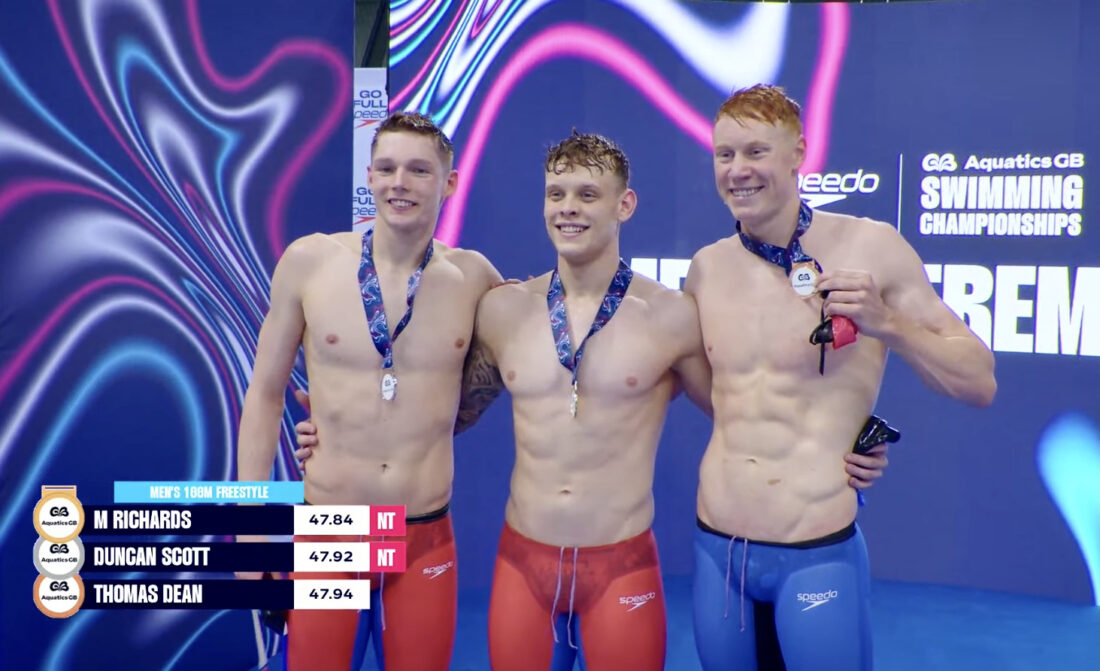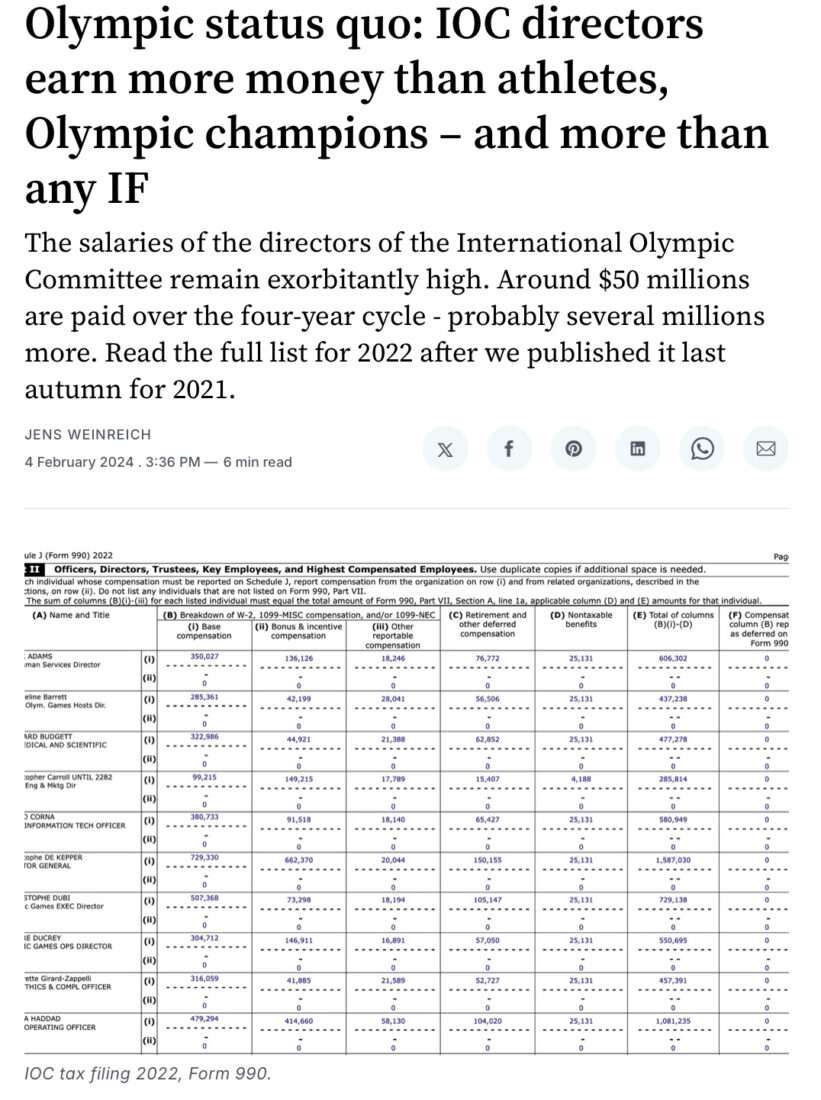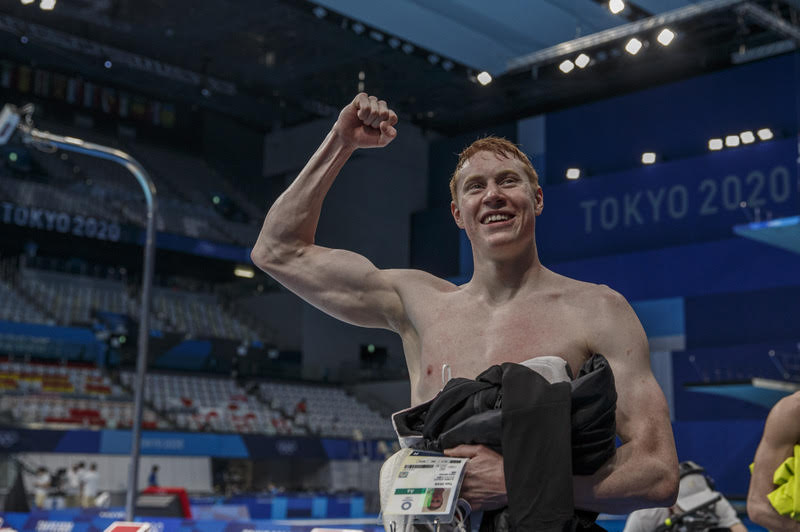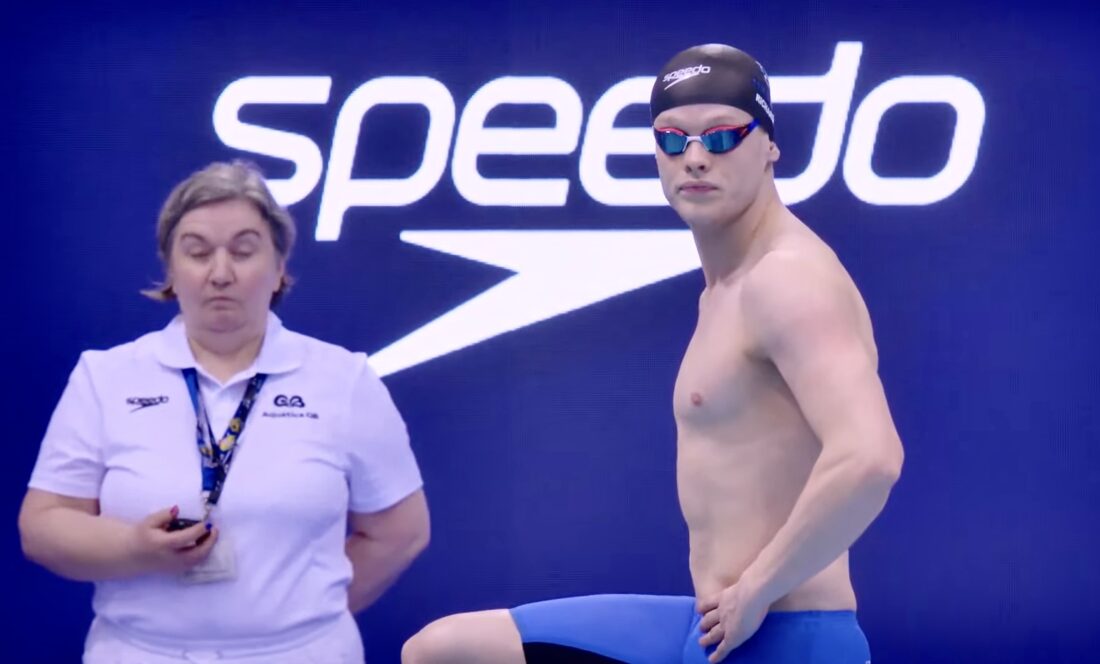Dean, Richards & Scott Join Chorus Calling On Swim Bosses To Match Athletics In Offering Money For Olympic Medals

Tom Dean, Matt Richards and Duncan Scott, Olympic 4x200m freestyle champions for Britain in Tokyo, have joined a chorus of calls from athletes asking their federations to step up and match the money-for-medals $50,000 gold-medal prize being offered by World Athletics at the Paris Olympic Games.
When World Athletics announced its news, World Aquatics confirmed to SOS that it would not be following that lead.
Speaking on a day when Britain announced a swimming team of 33 for the Paris Olympics, Dean, who with Adam Peaty became one of the first two British swimmers to win two golds at a single Games in 113 years, said: “When I tell people that we don’t receive any prize money from winning Olympic gold medals, that is always a shock and a surprise to everyone. Whereas we do in the world championships, the Europeans.
“It’s just the biggest screen, in front of the most people, millions and millions of viewers, but you don’t see anything in return,” added Dean.
Duncan Scott, winner of gold with Dean, Matt Richards and James Guy in the 4x200m freestyle in Tokyo, said with a smile that the prize money offered by World Athletics, headed by Britain’s track great of the 1980s Sebastian Coe, is even bigger at a World Championships than the sums now being offered for gold alone at an Olympics.
Dean, Richards and Scott all noted in varying ways that complaints from those who think of the Olympics as an “amateur” event overlooked the fact that tennis players and other athletes from pro-sports who earn millions in prize money and earn a living from their skills and work also compete at the Games.
There have been suggestions of mumbling and groaning at IOC HQ in Lausanne and far beyond as a result of the World Athletics move. No wonder.
Name me 11 swimmers who can boast annual earnings of the kind laid out below at The Inquisitor. Elite athletes receive less than 10% of IOC revenues but the IOC argues that it redistributes 90% of all income because it sends much of the vast sums of money generated from TV rights to National Olympic Committees and to international federations such as World Aquatics, which then uses those revenues to offer prize money at its own showcase events.
You can read this at The Inquisitor Magazine:

Form 990, the IOC administration must also provide information on the salaries, bonuses and other benefits for the executives. You will look in vain for such information in the IOC’s annual financial reports – like many other fundamentally detailed figures that have never been published.
For example? In the annual reports …
- There is no detailed information on individual payments from all sponsors and other partners, only totals.
- There is no detailed information on individual payments by all TV rights holders, only totals.
- There are no details of individual payments made by the IOC to each National Olympic Committee, only totals.
- There is no detailed information on individual payments made by the IOC to all Olympic sport federations (IFs), only totals and, in minor cases, a small amount of information (e.g. on payments for guest Olympic sports).
- There is no detailed information on exact payments and services provided by the IOC and its partners to Olympic Organising Committees – only totals, which do not distinguish, for example, between cash payments and value in kind services.
“No An Amateur Games Any More”, Says Richards – Spot On!
In one of three round-robin calls with British media, Richards said: “And there needs to be some conversations about how we better support athletes at the Olympics because it’s not an amateur Games any more. There are basketball players there who are earning hundreds of millions a year. Footballers, tennis players, golfers, are in the same position.”
A local TV station in Germany ran an item last week in which one of the nation’s top, medal-winning rowers, stood on a street corner asking passers by to contribute to a fund-raising exercise so that Olympic teamsters and aspiring teamsters could afford to go on the planned training camps ahead of the Paris Games. It’s a common theme the world over.
Commentary: State funds and even sponsorships and partnerships do not stretch making Olympic sport a career in the way it’s seen: apart from a relatively few outstanding athletes in specific sports, the entire Movement is heavily subsidised by hidden investors, from Bank of Mum and Dad to local business and communities who get no say, along with the vast majority of athletes, in the decision-making process, including how and on what and whom that Movement spends its money.
Nor do they have a say when it comes to matters such as the Sun Yang saga, allowing Russians, even one with two doping suspensions to her name (no, not that one) into the pool at Rio 2016 in the midst of a systematic cheating crisis, and this year allowing Putin’s ambassadors in tracksuits (no, not flip, consider the abuse and use of Kamila Valieva and the rallies at which swimmers and others are roped in to warmongering and politics of the kind the Olympic Charter banishes, at least in word) into Paris 2024, the weakness of governance forcing innocent athletes to express their deep-seated feelings as their nation is destroyed and her citizens murdered in an illegal war.
The IOC, of course, is not a democracy and has a record of quaffing with national leaders Olympic sport would have been wiser not to touch with a barge pole.
In Britain, National Lottery funding, one of the mechanisms to ensure elite sports get the resources they need to remain competitive, has been a god-send for athletes and has undoubtedly helped the nation rise up the ranks of successful Olympic nations come the Games. But even those levels of funding do not stretch to Olympic athletes being able to say they earn a living from sport in a nation where for every 11 men who can say that in pro sports, 1 woman is able to do so.
Dean said it was “quite tough when someone who has been doing track and field, who has worked just as hard as you for just as many years, is getting this financial reward for winning medals. It’s [a] pretty obvious contrast.”
Dean, who was speaking after being named in a 33-strong Team GB squad on the eve of 100 days to go until the opening ceremony in Paris, said he hoped World Athletics’ decision would prompt changes across the Olympic movement. He noted:

“When we swim at the Olympics we have millions of viewers. We are the ones doing the work, it would be great to see something back for that, Obviously people don’t do it for money. But I do hope what has happened in athletics will have a trickle-down effect in other sports and hopefully swimming.”
Tom Dean – photo: Tom Dean of Great Britain celebrates his 200m freestyle victory in Tokyo – by Patrick B. Kraemer
Richards urged the International Olympic Committee to spend more of its vast athlete-generated revenues – it made $7.6bn in the last Olympic cycle – on prize money. He said:

“It’s crazy money, big business. When you look at that, you go: ‘Well, it makes a lot of money but then the athletes aren’t actually going to be able to win any of that. If the IOC steps up and [says]: ‘We’ll just put a blanket amount, this is how much the medals are worth across all sports’ that would make a lot of athletes a lot happier.”
Matt Richards
Richards did not want to see athletes tempted to head off to the kind of Enhanced Games $1m sweetener that James Magnussen, former Dolphin and Australian sprinter when in the anti-doping pool, appears to have been tempted by to “break a world record” (50m free) that he cannot break unless he takes a doping test.
Said Richards: “To protect the sport, and to protect the Olympics and protect everything that’s great about what we do, the governing bodies like World Aquatics and the IOC are going to have to start putting some money up to the athletes to keep them from straying over to things like that.”
His parents doubtless agree. Here’s a touch of the investment of years, from little swimmer to World champion:
As said, elite athletes receive less than 10% of IOC revenues but the IOC argues that it redistributes 90% of all income because… because it decides where to spend its money and much of that ends up in the hands of folk in tailored suits not fast suits.
Where World Athletics will spend $2.4m of its IOC-allocated funds as prize money in Paris this July and August, World Aquatics will not, having spent what it wanted to allocate to athletes in prize money (from a bank account that relies heavily on money generated by the Olympics) at World Championships, including those held in Doha in February, when most of the big medals hopes for Paris were absent from the Covid-contract-catchup crunch event.
Scott said: “It’s something that the whole sport wants to see. I think financially something needs to change in our sport, whether it’s at worlds or elsewhere.”